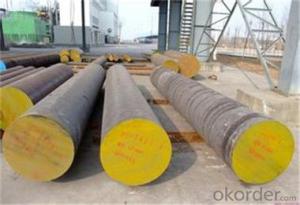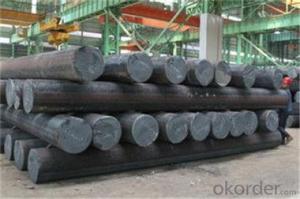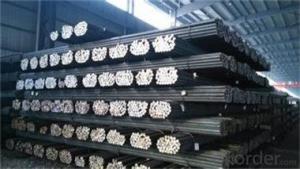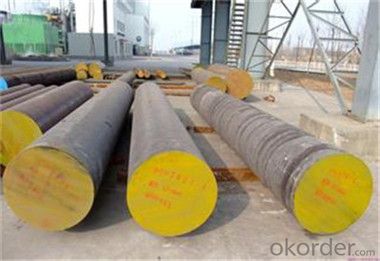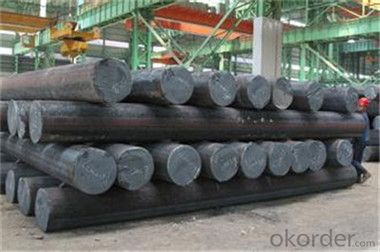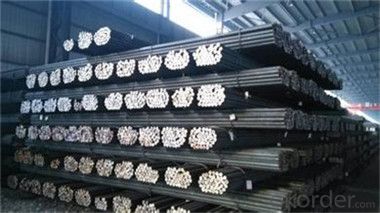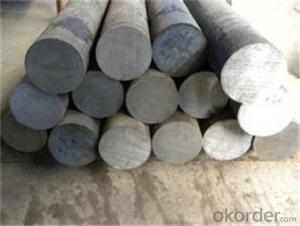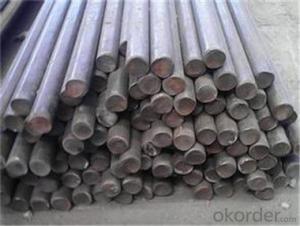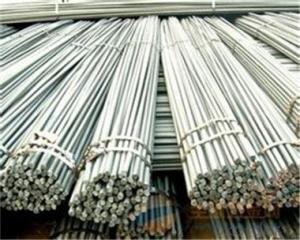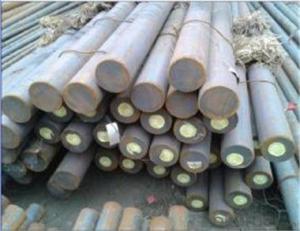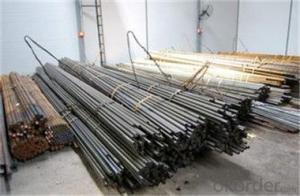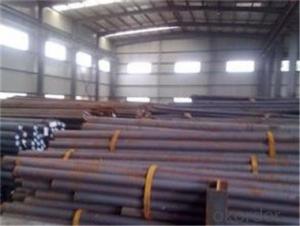Hot Rolled 12mm Steel Rod Price Steel Bars
- Loading Port:
- Tianjin
- Payment Terms:
- TT OR LC
- Min Order Qty:
- 22 m.t.
- Supply Capability:
- 2000000 m.t./month
OKorder Service Pledge
OKorder Financial Service
You Might Also Like
Description of steel round bar:
(1) Thickness of not more than 2MM sheet, efficient blanking die, punch die and pressure die etc.
(2) All kinds of scissors, inserts, woodworking blade.
(3) Thread rolling die and wear-resistant slider.
This steel has good workability,processing deformation is small, anti fatigue performance is quite good, belongs to medium quenching steel,4140 after heat treatment, it has good strength and good comprehensive mechanical properties.The process is good.
Festures of steel round bar:
4340 Forged Round Steel Bar
1.Dia 80-800mm Length:2000-13000mm or as required
2.Technique:Forged
3.Delivery Time:45 days
Specifications of steel round bar:
Round bar | Diameter(mm) | Length (mm) | |
10~800 | 2000~5800 | ||
plate/sheet | Thickness(mm) | Width (mm) | Length (mm) |
10~800 | 80~2300 | 2000~5800
|
Images of steel round bar:
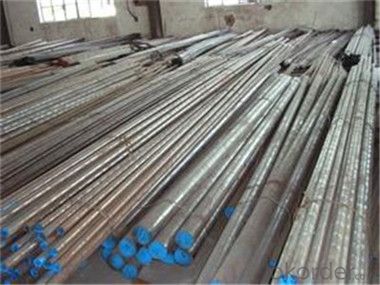
FAQ:
1. How long is the lead time?
Delivery time: 45 days after order confirmed.
2. What payment term do you accept?
Payment: T/T or L/C at sight.
- Q: How do steel round bars perform in high-pressure applications?
- Highly suitable for high-pressure applications, steel round bars are renowned for their exceptional strength and durability. When exposed to high-pressure conditions, these bars demonstrate outstanding resistance to deformation and uphold their structural integrity. As a result, they can endure intense forces while maintaining their shape, thereby guaranteeing the safety and dependability of the application. Steel round bars find widespread use in high-pressure applications, including hydraulic systems, oil and gas pipelines, aerospace components, and high-pressure vessels. Their robust nature empowers them to withstand the extreme pressures encountered in these scenarios without experiencing failure. The high tensile strength of steel ensures that the bars do not buckle or collapse under pressure, providing the vital support and stability required in demanding environments. Moreover, steel round bars possess superior corrosion resistance properties, a critical characteristic in high-pressure applications. They exhibit exceptional tolerance to harsh chemicals, moisture, and other corrosive elements, preventing rusting or degradation over time. This corrosion resistance guarantees the longevity and dependability of the steel round bars in high-pressure environments, mitigating the risk of premature failure. Additionally, steel round bars offer versatility in terms of grades and alloys, enabling customization to meet specific high-pressure requirements. Various grades of steel, such as carbon steel, alloy steel, or stainless steel, can be employed based on the demands of the application. This versatility ensures that the steel round bars can be tailored to deliver optimal performance and fulfill the precise pressure and temperature prerequisites of the application. In conclusion, the exceptional strength, durability, and corrosion resistance properties of steel round bars make them ideal for high-pressure applications. Their ability to withstand intense forces while maintaining their shape renders them a reliable choice for numerous industries, encompassing hydraulic systems, oil and gas pipelines, aerospace, and high-pressure vessels. By employing steel round bars, companies can ensure the safety, dependability, and longevity of their high-pressure applications.
- Q: What are the different grades of steel used in round bars?
- The different grades of steel used in round bars vary depending on the desired properties and applications. Some common grades include mild steel (low carbon steel), stainless steel, alloy steel, and tool steel. Each grade offers specific characteristics such as strength, corrosion resistance, hardness, or machinability, allowing for a wide range of applications in industries like construction, manufacturing, automotive, and aerospace.
- Q: What are the different types of steel round bars used in the defense industry?
- There are several different types of steel round bars that are commonly used in the defense industry. These materials are specifically chosen for their strength, durability, and ability to withstand harsh conditions. Some of the most commonly used steel round bars in the defense industry include: 1. High-strength low-alloy (HSLA) steel round bars: These bars are known for their high strength-to-weight ratio, making them ideal for applications where weight reduction is important. HSLA steel round bars are often used in the construction of armored vehicles, tanks, and other military equipment. 2. Stainless steel round bars: Stainless steel is highly resistant to corrosion and rust, making it an excellent choice for defense applications where exposure to moisture or harsh environments is common. Stainless steel round bars are frequently used in the manufacturing of military aircraft, naval vessels, and firearms. 3. Carbon steel round bars: Carbon steel is a versatile and cost-effective material that is widely used in the defense industry. It offers excellent strength and hardness, making it suitable for various applications such as missile components, gun barrels, and armor plates. 4. Alloy steel round bars: Alloy steel is a combination of different metals, typically including chromium, molybdenum, and nickel, which enhances its mechanical properties. Alloy steel round bars are commonly utilized in the production of military-grade vehicles, artillery systems, and munitions. 5. Tool steel round bars: Tool steel is specifically designed to have exceptional hardness, wear resistance, and toughness. It is often used for manufacturing cutting tools, drills, and other equipment used in the defense industry. Each type of steel round bar has its own unique properties and advantages, allowing it to fulfill specific requirements in the defense sector. The selection of the appropriate steel round bar depends on the specific application and the desired performance characteristics needed to meet the demands of the defense industry.
- Q: Can steel round bars be used in the manufacturing industry?
- Certainly! In the manufacturing industry, steel round bars find extensive utility. These bars exhibit great versatility and are extensively employed across diverse manufacturing processes. Machining, forging, welding, and fabrication all benefit from their usage, facilitating the creation of an array of products, including machinery parts, tools, automotive components, construction materials, and more. These round bars boast exceptional robustness, durability, and remarkable wear resistance, rendering them highly suitable for arduous manufacturing applications. Furthermore, manufacturers can select from a range of grades and sizes, enabling them to opt for the most appropriate option tailored to their specific needs.
- Q: Can steel round bars be used in the manufacturing of consumer goods?
- Yes, steel round bars can be used in the manufacturing of consumer goods. Steel is a versatile and durable material that can be shaped into various forms, including round bars, to meet specific manufacturing requirements. These round bars can be utilized in the production of a wide range of consumer goods such as furniture, appliances, tools, and automotive components, among others.
- Q: How are steel round bars inspected for quality?
- Steel round bars are inspected for quality through various methods such as visual inspection, dimensional measurements, and non-destructive testing techniques. These inspections involve checking for surface defects, ensuring accurate dimensions, and detecting any internal flaws or inconsistencies. Additionally, quality control measures may include hardness testing, chemical analysis, and mechanical property evaluations to ensure the steel bars meet the required standards and specifications.
- Q: What are the different surface treatments available for steel round bars?
- There are several surface treatments available for steel round bars, including: 1. Pickling and Passivation: This process involves removing impurities and oxides from the surface of the steel using an acid solution, followed by the application of a passivation treatment to enhance corrosion resistance. 2. Hot-dip Galvanizing: Steel round bars can be immersed in a bath of molten zinc, which forms a protective coating on the surface. This treatment provides excellent corrosion resistance. 3. Electroplating: This process involves applying a thin layer of metal, such as chromium or nickel, onto the surface of the steel round bar using an electrochemical method. It enhances the aesthetic appearance and provides some level of corrosion resistance. 4. Powder Coating: A dry powder is applied electrostatically to the steel round bar and then cured under heat. This results in a durable and protective coating that is resistant to corrosion, chemicals, and UV radiation. 5. Nitriding: In this treatment, the steel round bar is exposed to a nitrogen-rich atmosphere at high temperatures. This forms a hard and wear-resistant surface layer, improving the bar's performance in applications where hardness and durability are important. 6. Chrome Plating: A layer of chromium is electroplated onto the surface of the steel round bar, providing both aesthetic appeal and corrosion resistance. These are just a few examples of the different surface treatments available for steel round bars, and the choice depends on the specific requirements of the application, such as corrosion resistance, durability, and aesthetic considerations.
- Q: Can steel round bars be used in the construction industry?
- Steel round bars have become a common choice in the construction industry due to their versatility and wide usage in various structural applications. These bars possess high strength and durability, making them suitable for providing structural stability and supporting heavy loads in buildings, bridges, and other construction projects. In concrete structures, such as columns, beams, and slabs, steel round bars can be utilized as reinforcement to enhance their strength and resistance against bending or cracking. Moreover, the construction industry often relies on steel round bars for the fabrication of steel frameworks, scaffolding, and other support systems. The availability of these bars in different sizes and grades allows for flexibility in meeting specific construction requirements. In summary, steel round bars are an essential component in the construction industry, thanks to their strength, versatility, and ability to withstand demanding conditions.
- Q: What are the advantages of using chromium-alloy steel round bars?
- Chromium-alloy steel round bars offer numerous benefits. Firstly, they possess exceptional corrosion resistance. The addition of chromium enhances their ability to withstand corrosion and oxidation, making them suitable for use in harsh environments and applications involving moisture or chemicals. This resistance prolongs their lifespan, reducing maintenance and replacement expenses. Secondly, these round bars provide high strength and durability. The alloying of chromium with steel improves their mechanical properties, including tensile strength, hardness, and toughness. As a result, they are ideal for applications requiring strength and resistance to wear and tear, such as construction, heavy machinery, and the automotive industry. Another advantage is their heat resistance. The inclusion of chromium enhances the steel's ability to maintain its strength and structural integrity even at high temperatures. This makes it suitable for use in high-temperature applications like furnace components, boilers, and heat exchangers. Moreover, chromium-alloy steel round bars are known for their excellent machinability. The alloying elements in the steel enhance its ability to be easily machined, enabling precise shaping and finishing. This simplifies and reduces the cost of manufacturing complex components or parts. Lastly, these round bars are readily available in the market. Due to their popularity and widespread use, they can be easily obtained from various suppliers. This availability ensures a consistent supply of the material, minimizing production downtime and lead times. Overall, the advantages of using chromium-alloy steel round bars encompass corrosion resistance, high strength and durability, heat resistance, excellent machinability, and availability. These properties make them a versatile and dependable choice for various industries and applications.
- Q: What are the different surface treatments available for alloy steel round bars?
- Some of the different surface treatments available for alloy steel round bars include black oxide coating, galvanization, chrome plating, nitriding, and powder coating. Each treatment offers unique benefits such as enhanced corrosion resistance, improved wear resistance, increased hardness, and aesthetic appeal. The choice of surface treatment depends on the specific requirements and desired performance characteristics of the alloy steel round bars.
Send your message to us
Hot Rolled 12mm Steel Rod Price Steel Bars
- Loading Port:
- Tianjin
- Payment Terms:
- TT OR LC
- Min Order Qty:
- 22 m.t.
- Supply Capability:
- 2000000 m.t./month
OKorder Service Pledge
OKorder Financial Service
Similar products
Hot products
Hot Searches
Related keywords
